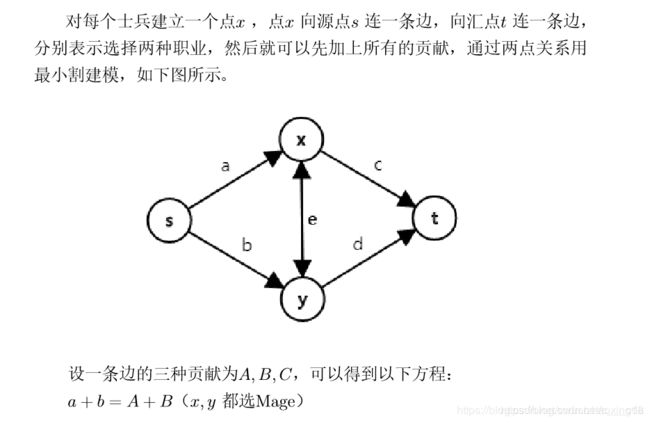2019HDU多校赛第二场 H HDU 6598 构图思想
Harmonious Army
Now, Bob is playing an interesting game in which he is a general of a harmonious army. There are n soldiers in this army. Each soldier should be in one of the two occupations, Mage or Warrior. There are m pairs of soldiers having combination ability. There are three kinds of combination ability. If the two soldiers in a pair are both Warriors, the army power would be increased by a. If the two soldiers in a pair are both Mages, the army power would be increased by c. Otherwise the army power would be increased by b, and b=a/4+c/3, guaranteed that 4|a and 3|c. Your task is to output the maximum power Bob can increase by arranging the soldiers’ occupations.
Note that the symbol a|b means that a divides b, e.g. , 3|12 and 8|24.
Input
There are multiple test cases.
Each case starts with a line containing two positive integers n(n≤500) and m(m≤104) .
In the following m lines, each line contains five positive integers u,v,a,b,c (1≤u,v≤n,u≠v,1≤a,c≤4×106,b=a/4+c/3) , denoting soldiers u and v have combination ability, guaranteed that the pair (u,v) would not appear more than once.
It is guaranteed that the sum of n in all test cases is no larger than 5×103 , and the sum of m in all test cases is no larger than 5× 1 0 4 10^4 104 .
Output
For each test case, output one line containing the maximum power Bob can increase by arranging the soldiers’ occupations.
Sample Input
3 2
1 2 8 3 3
2 3 4 3 6
Sample Output
12
题意:
n个士兵 m 个组合
每个士兵可以转职战士或者魔法师
u 和 v 组合 两个战士战力+a 两个法师战力+c 其他战力+b
求最多加多少战力
分析:
官方题解:


参考一篇bloghttps://blog.csdn.net/u013534123/article/details/97142191
有其他的博主说这是明显的 两点式求最小割 ,其中洛谷的P1361这道题目思想和hdu的这题类似,在P1361中,是存在两个区域的划分,那么在这到题目中是分成了三个部分,
这个我们假设W,M和两者分别是W与M,那么根据洛谷的那一道题目来说,可以设M部分是归于S集合的,W部分是归于T集合,那么剩下的那一部分就是S与T的边界了。然后将所有的权加和,最后减去这个最小割就可以了。
不过有一个地方需要注意,就是计算的时候要将A,B,C的值全部扩大二倍,这是防止做除法的时候出现小数的问题。
为什么要用最小割呢,可以这样来想,我们将所有的权值按照计算公式将其建好图,那么我们根据最小割这个性质,是将这个图一分为二的割线,那么所有的权值和减去这个最小割不就是最优的答案吗
或者说可以将其看成是亏损值,这样的话让亏损值越小越好,同样的,还是使用上面的那个图,如果按照亏损的思想来看,那么从S到X和Y的亏损值就是a/2+b/2(反过来想,就是选择Warrior亏损的值),,X和Y到T的亏损值就是b/2+c/2,Y与X之间的就是(a+c)/2-b;
#include